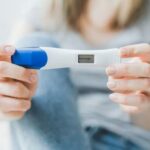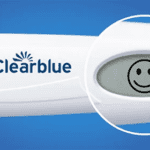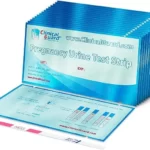
Finding out if you are pregnant or not can be a moment of great anticipation and anxiety. Understanding when to take a pregnancy test is crucial to obtain accurate results. Many factors can influence the timing and accuracy of these tests, such as the type of test used, the levels of pregnancy hormone in your body, and your menstrual cycle. In this article, we will delve into the question, “How many days after sex can you take a pregnancy test?” We will provide you with comprehensive information and expert advice to help you navigate this important aspect of reproductive health.
Related: When To Have Sex After C-Section?
How Many Days After Sex Can You Take A Pregnancy Test?
Taking a pregnancy test too early may yield inaccurate results, leading to confusion and anxiety. It is essential to wait for the right time to maximize the accuracy of the test. The timing depends on various factors, including the type of pregnancy test and the levels of human chorionic gonadotropin (hCG) in your body.
Types of Pregnancy Tests
There are two main types of pregnancy tests: urine tests and blood tests. Urine tests are the most common and convenient option for home use, while blood tests are typically performed at a healthcare provider’s office. The accuracy of both types of tests increases with time after intercourse.
Urine Tests
Urine tests detect the presence of hCG, a hormone produced by the placenta during pregnancy. These tests are usually available over-the-counter and are designed for self-use. Most urine tests claim to provide accurate results as early as the first day of your missed period. However, taking the test too early can lead to false negatives.
Blood Tests
Blood tests, on the other hand, are more sensitive and can detect lower levels of hCG compared to urine tests. They are typically conducted at a healthcare provider’s office and are of two types: quantitative and qualitative. Quantitative blood tests measure the exact amount of hCG in your blood, while qualitative tests provide a simple “yes” or “no” answer to the presence of hCG.
Timing Considerations
The accuracy of pregnancy tests depends on the concentration of hCG in your body, which increases as the pregnancy progresses. The timing of taking a pregnancy test after sex can vary depending on your menstrual cycle length, ovulation, and implantation.
Menstrual Cycle Length
To understand the timing, it is crucial to know the length of your menstrual cycle. The first day of your menstrual cycle is considered the first day of your period. On average, a menstrual cycle lasts around 28 days, but it can range from 21 to 35 days. The length of your cycle affects the timing of ovulation and, consequently, when you can take a pregnancy test.
Ovulation
Ovulation is the release of an egg from the ovary, which typically occurs around the midpoint of your menstrual cycle. For those with a 28-day cycle, ovulation usually happens around day 14. However, it is important to note that ovulation can vary from person to person and even from cycle to cycle.
Implantation
Implantation occurs when the fertilized egg attaches itself to the lining of the uterus. This process usually takes place around 6-12 days after ovulation. After implantation, the body starts producing hCG, which increases as the pregnancy continues.
When to Take a Pregnancy Test

Now that we have an understanding of the menstrual cycle, ovulation, and implantation, let’s discuss when to take a pregnancy test based on different scenarios.
Scenario 1: Regular Menstrual Cycle
If you have a regular menstrual cycle with a consistent length, the best time to take a pregnancy test is around one week after your missed period. This is typically when hCG levels are high enough to be detected by most urine tests. However, taking the test too early may result in a false negative. If you receive a negative result but still suspect you might be pregnant, it is recommended to wait a few more days and retest.
Scenario 2: Irregular Menstrual Cycle
For individuals with irregular menstrual cycles, determining when to take a pregnancy test can be more challenging. In this case, it is advisable to wait at least three weeks from the last time you had unprotected sex before taking a test. This waiting period allows enough time for hCG levels to rise, increasing the accuracy of the test.
Scenario 3: Early Pregnancy Symptoms
Experiencing early pregnancy symptoms, such as breast tenderness, fatigue, nausea, or frequent urination, may prompt you to take a pregnancy test earlier than the recommended timeframe. While these symptoms can be indicators of pregnancy, they are not definitive proof. It is important to note that symptoms can vary from person to person and can also be attributed to other factors. To obtain accurate results, it is still best to wait until the appropriate time according to your menstrual cycle.
Scenario 4: Testing before Missed Period
Some pregnancy tests claim to provide accurate results even before your missed period. These tests are often marketed as “early detection” or “early response” tests. While they may detect pregnancy hormones earlier, the accuracy of these tests can vary. The closer you are to your expected period, the more reliable the results will be. However, keep in mind that taking a test this early increases the chances of receiving a false negative. If you choose to take an early detection test, it is advisable to follow up with another test after your missed period to confirm the results.
Related: Sex After Hysterectomy
Conclusion
Determining how many days after sex can you take a pregnancy test is crucial for accurate results. While the timing can vary depending on factors such as menstrual cycle length, ovulation, and implantation, waiting for at least a week after your missed period is generally recommended. It is important to choose a reliable pregnancy test and follow the instructions provided. If you have any doubts or concerns, it is always best to consult a healthcare professional for guidance and support. Remember, taking a pregnancy test is an important step towards understanding your reproductive health and planning for the future.
Related: Sex After Vasectomy: What to Know?
Frequently Asked Questions (FAQs)
Can I take a Pregnancy Test the day after Intercourse?
No, it is not possible to accurately detect pregnancy the day after intercourse. It takes time for the fertilized egg to implant and for hCG levels to rise. Waiting at least a week after your missed period is recommended for reliable results.
Are all Pregnancy Tests equally accurate?
While most pregnancy tests are reliable, the accuracy can vary depending on the sensitivity of the test and the timing of when it is taken. It is important to follow the instructions provided with the test and consult a healthcare professional if you have any doubts.
Can Stress or Medications affect the accuracy of a Pregnancy Test?
Stress and certain medications are unlikely to affect the accuracy of a pregnancy test. However, it is always advisable to read the instructions carefully and consult a healthcare professional if you are unsure about any potential interference.
Can I take a Pregnancy Test at any time of the day?
Yes, you can take a pregnancy test at any time of the day. However, for early detection tests, it is generally recommended to use the first urine of the morning when the hCG concentration is typically higher.
What should I do if my Pregnancy Test result is positive?
If you receive a positive result, it is important to schedule an appointment with a healthcare provider to confirm the pregnancy and receive appropriate prenatal care. A healthcare professional will be able to guide you through the next steps and provide necessary support.
Can a Pregnancy Test give a false negative result?
Yes, a pregnancy test can give a false negative result, especially if taken too early. It is recommended to wait for at least a week after your missed period to minimize the chances of a false negative. If you suspect you might be pregnant despite a negative result, it is advisable to retest after a few days or consult a healthcare professional for further evaluation.












